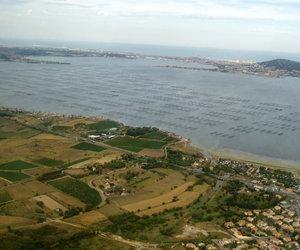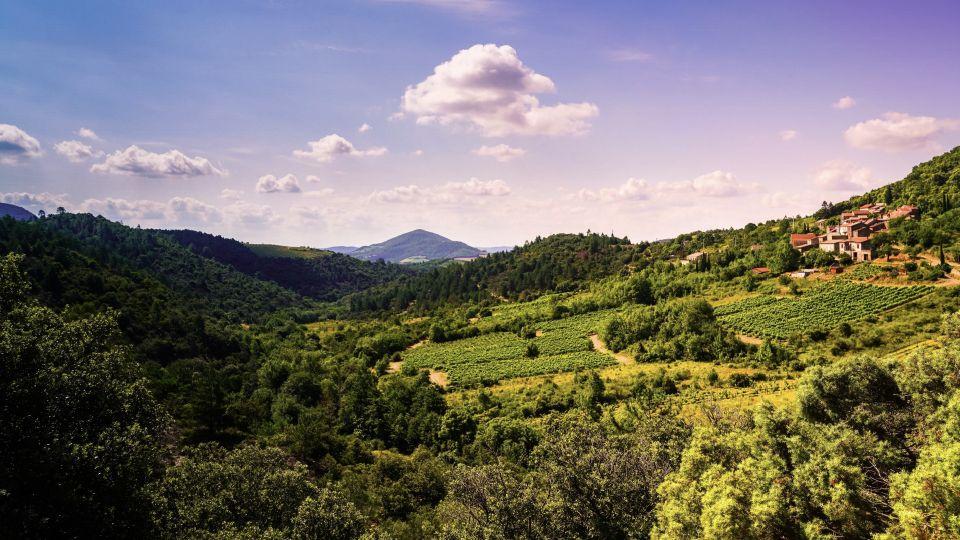



Welcome
to

Languedoc!

Between the warm sun of the Mediterranean Sea and cooling Atlantic winds, you’ll find Languedoc, a region characterized by a diversity of terroir, a wide array of wines and a southern French character that stands apart. Nature defines us, delivering more than 300 days of sunshine each year to nurture the independent spirit of our growers, winemakers and négociants. Together, we cultivate the most organic vines in Guided by instinct and techniques honed by centuries of history, our 3,000 offer a rich variety of wine, from the red blends of Corbières, to charming rosé, white Picpoul and sparkling Limoux. 1 2

3 1
Coastal Terroir


Atlantic Corridor
Hills & Mountains 2 3
LANGUEDOC: BY THE NUMBERS

2,500 years of winegrowing history



20 AOPs

80,000+ acres of vines

140 million bottles produced per year
A leading producer in organic wines


U.S #1 export market by volume/value

3 colors (red, white and rosé) + sparkling & sweet wines


60% 20%
20%

A LEADER IN ORGANIC WINES
30% of France’s organic vineyards are in Languedoc

10% of organic acreage worldwide is in Languedoc
30% of acreage currently being converted
Sustainability In Action
MANIFESTO
Non-invasive treatments
Organic insect repellants

Protecting & planting hedges
Collecting rainwater

Protecting animal habitats
Focus on biodiversity
…and much more!
All Languedoc appellations share ongoing reports on sustainability and have ambitious objectives for organic or other sustainable certifications.

LANGUEDOC: A HISTORY



The father of resistant grape varieties began his research at L’ INRA in


1st


Languedoc launched the world’s first all organic expo, still going strong today.

1709 1285 1544 1st Century BC Discovery of fortifying wines by Arnaud de Villeneuve Bubbles! LA BLANQUETTE DE LIMOUX The first sparkling wine was made in Languedoc Planting of hillside vineyards
OF INNOVATION The Roman Era 1970 1993 Looking Ahead GRAFTING developed by Jules-Emile Planchon helped overcome the phylloxera crisis of 1868 1873 ALAIN BOUQUET
Montpellier
Millesime Bio
Get to know Languedoc, the new French wine scene.
THE LANGUEDOC APPELLATION SYSTEM
Languedoc wines are grouped in 5 classifications for AOP wines that capture the range of styles and terroir in our region.

SUBREGIONALAOPS
AOP’s
THE AOPsDESIGNATEDVILLAGE
THE WINESPARKLING AOPs THESWEETWINEAOPs
AOP LANGUEDOC
Regional appellation
THE VILLAGE-DESIGNATED AOPS
La Clape
Fitou
Minervois la Livinière
Corbières Boutenac
Faugères
THE SUB-REGIONAL AOPS
Corbières
Saint Chinian
Malepère
Clairette Du Languedoc
Limoux
Pic Saint-Loup
Picpoul de Pinet
Cabardès

Terrasses du Larzac
THE SWEET WINE AOPS
Muscat de Lunel
Muscat de Mireval
THE SPARKLING WINE AOPS
Crémant de Limoux
Limoux Blanquette de Limoux
Limoux Méthode Ancestrale
AOP LANGUEDOC
CLIMATE DEFINES OUR TERROIR

KEY ASPECTS
Garrigue limestone soils with low-lying scrub, herbal vegetation

Aromatic plants thyme, rosemary, spike lavender, juniper, boxwood, holm oak
Maquis type of vegetation thrives in acidic siliceous soils— i.e. schist, sage, bay, lavender, heather, arbutus

320 days of sunshine per year

1 2
Coastal Terroir Atlantic Corridor Hills & Mountains 1 2 3
3



ZONE 1: COASTAL TERROIR


KEY CHARACTERISTICS
Many indigenous grapes such as Piquepoul, Bourboulenc, Clairette and Muscat

Long, warm summers with abundant sunshine and mild, wet winters

Sedimentary soils, limestone, mineral-rich clay and sandstone

Rich red blends and unique whites that benefit from fully ripened grapes and healthy vine-to-water balance

1
MediterraneanSea
City of Montpellier

Picpoul de Pinet vineyards


Mediterranean coastline

Boutenac vineyards
SANDSTONE soils
Grès de Montpellier







CLAY: Red volcanic soils in Cabardès

LIMESTONE soils in La Clape



KEY CHARACTERISTICS

Atlantic and Mediterranean grape varieties (Cabernet Franc, Cabernet Sauvignon, Mauzac, Malbec/Côt, Chenin, Chardonnay)


Cool, moist climate shaped by two winds — the crisp, dry Atlantic wind from the west and the warm Mediterranean wind from the east Rocky soil (sandstone and limestone) creates a distinct terroir

TOWARDSTHEATLANTIC
Distinguished reds, lush whites, and bright sparkling wines made from a wide range of grape varieties and blends



2 ZONE 2: ATLANTIC
MediterraneanSea
SANDSTONE







Vineyards



 soils in Limoux
Abbaye de Saint-Hilaire in Limoux
City of Carcassonne
of Limoux Mountainous, Atlantic influences
soils in Limoux
Abbaye de Saint-Hilaire in Limoux
City of Carcassonne
of Limoux Mountainous, Atlantic influences
KEY CHARACTERISTICS
Carignan, Grenache, Mourvèdre and Syrah are a few of the major varieties found in this zone




Dry, hot climate in the summer and cold in the winter; warm days and cool nights

Ruffe (red sandstone), Jurassic limestone, basalt terraces and schist
Higher elevations and volcanic subsoils create rich red wines with tannic intensity and refreshing rosés

3 ZONE 3: HILLS & MOUNTAINS
MediterraneanSea
SCHIST soils in Faugères, Saint-Chinian

CLAY: Red volcanic soils in Terrases du Larzac



Saint-Chinian








Château d'Aguilar in Tuchan, Corbières

LIMESTONE soils in Corbières, Minervois-la-Livinière, Pic Saint Loup


 Pic Saint-Loup
Faugères
City of Béziers
Pic Saint-Loup
Faugères
City of Béziers
LANGUEDOC: WINE STYLES - TASTING GUIDE


WHITES
60% of all production
TOP VARIETIES
20% of all production
Syrah
Grenache
Mourvèdre
Carignan

Cinsault
Counoise
Piquepoul Noir
Terret Noir
20% of all production
Chardonnay
Roussanne
Marsanne
Viognier
Chenin
Mauzac
Piquepoul
Bourboulenc
Clairette
Grenache


Blanc/Gris

ROSÉ
%
SWEET
861,000 9L cases/ year
TOP VARIETIES
Mauzac (Blanquette)



Chardonnay

Chenin Blanc

Pinot Noir
43,000 9L cases/ Year (Muscats de Lunel and Mireval)
Muscat Blanc

%
REACH OUT FOR MORE INFORMATION!



CONTACT
Contacts in the US:




Helen Gregory – helen@gregoryvine.com
Katie Keith – katie@gregoryvine.com
Claire Martin – claire@gregoryvine.com
Contact in France:
Estelle Nijhof – enijhof@languedoc-wines.com


@LanguedocWines


































































 soils in Limoux
Abbaye de Saint-Hilaire in Limoux
City of Carcassonne
of Limoux Mountainous, Atlantic influences
soils in Limoux
Abbaye de Saint-Hilaire in Limoux
City of Carcassonne
of Limoux Mountainous, Atlantic influences
























